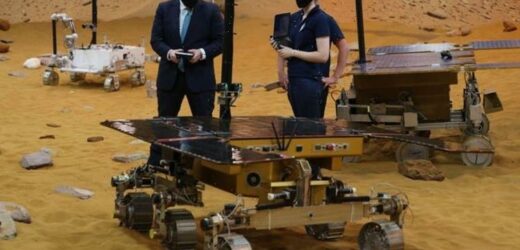Boris Johnson on quarantine rules for vaccinated passengers
We use your sign-up to provide content in ways you’ve consented to and to improve our understanding of you. This may include adverts from us and 3rd parties based on our understanding. You can unsubscribe at any time. More info
The Prime Minister visited Airbus’ new £35million UK space and defence headquarters in Stevenage yesterday. The new facility will serve 500 engineers and experts as part of the company’s continued investment into Britain’s future in space. Mr Johnson visited the Mars Yard, where he tried his hand at the Rover’s controls – before opening the new environmentally friendly HQ, Orbit House.
He said: “I’ve been blown away by what I’ve seen here at Airbus in Stevenage.
“I think a lot of people realise that Airbus in Wales produces half the wings of all the passenger jets in the world, quite an amazing thing about the UK economy.
“I don’t think people realise that we produce, on this site, a quarter of all the telecoms satellites and there’s a massive future for the UK in satellites and satellite technology.
“I’ve just seen a satellite that will be helping to measure the biomass of the world’s rainforests which is absolutely crucial for our ability to understand the consequences of global warming and what we need to do to tackle it.


“So, we’re boosting our satellite technology. Great to see Airbus launching a new facility here today.”
Chairman of Airbus Defence and Space UK, Julian Whitehead, dubbed Stevenage as the “jewel in our space crown” and said it will be the UK’s headquarters for satellite design, manufacturing and operations.
He added: “Our UK engineers are sending rovers to Mars, probes to the Sun, building satellites to fight climate change and underpinning secure military communications.
“It was a pleasure to welcome the Prime Minister today and talk him through our plans for the future.”

Airbus Defence and Space UK makes up 70 percent of the UK’s space industry.
Its missions have included the Solar Orbiter, which is currently heading to the Sun, as well as the European Space Agency’s ExoMars rover which is due to launch in 2022.
It comes after the Government released its long-awaited innovation strategy.
It is intended to safeguard its international scientific preeminence post-Brexit, reiterates the country’s commitment to boosting research investment to a record £22 billion per year by 2024–25.
DON’T MISS
Black hole shock: Scientist’s dire warning to humans [VIDEO]
Asteroid apocalypse: Scientist warns of ‘city-destroying’ space rock [OPINION]
Why ‘Trillion tonne rock hurtling towards Earth’ was ‘bad news’ [EXPLAINED]


The strategy outlines seven strategic technologies for UK investment that leverage the nation’s existing strengths.
These areas include advanced materials and manufacturing, bioinformatics and genomics, and engineering biology. The area of advanced materials includes metamaterials, 2D materials, self-healing and animate materials, as well as composite structures.
The Government vowed that they would “ement the UK’s position as a world leader in science, research and innovation”.
Source: Read Full Article

